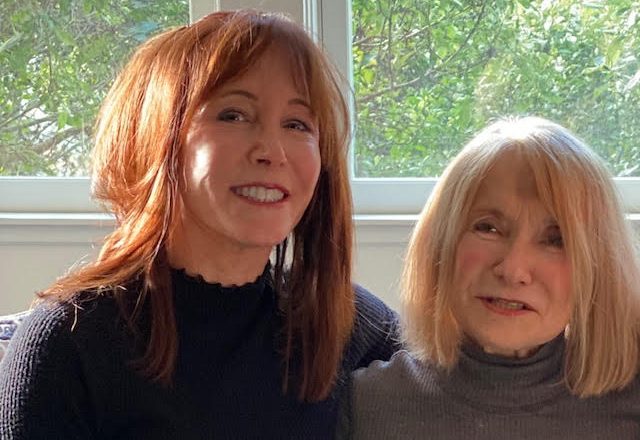
Her mom was an attorney — a “brilliant, brilliant, bright star.” They used to talk every single day. “She was my cornerstone — she always had the best advice,” said Jil Wexler.
But now, “She’s disappeared.”
Alzheimer’s disease is a slow death, a long goodbye, a soul-crusher as the people we know and love fade before our eyes. It’s one of the leading causes of death in California, and the Alzheimer’s death rate here is among the highest in the nation — eclipsed only by Mississippi, Alabama, Georgia, Louisiana, Arkansas, Texas, Tennessee, Washington and Utah, according to the U.S. Centers for Disease Control and Prevention.
As people live longer, the number of folks with Alzheimer’s is expected to grow exponentially — and, disturbingly, more young people are being diagnosed with early-onset dementia and Alzheimer’s, according to a sobering 2020 study by Blue Cross/Blue Shield. Though the numbers were small, diagnoses among insured folks aged 30 to 64 increased 200% over just five years, with women more heavily impacted than men, the study found.
Luckily — for those of us who are not getting any younger — Southern California is a hotbed of Alzheimer’s research, and the Alzheimer’s Foundation of America is hosting a free Educational Conference for Southern California from 10 a.m. to 1 p.m. Wednesday, April 19 at Hilton Irvine, 18800 MacArthur Blvd.
Folks can learn about the latest science from experts at UC Irvine, how to mobilize local support for the sometimes-overwhelming job of caregiving from folks at Alzheimer’s Orange County, explore how young folks can get involved and get tips on keeping the brain in tip-top shape. Advance registration is highly recommended at www.alzfdn.org/tour.
Over the next 20 years, the impact of Alzheimer’s disease and related dementias on the state of California will increase dramatically, said a recent study from the California Department of Public Health.
Learn, connect
Sessions will include “Looking Forward to a Future Without Alzheimer’s,” where Frank M. LaFerla, director of the UCI Alzheimer’s Disease Research Center at the university’s Institute for Memory Impairments and Neurological Disorders, will talk about the latest research underway. UCI was recently awarded a $47 million grant from the National Institute on Aging to develop next-generation mouse models for studying late-onset Alzheimer’s, and Hoag Hospital is the site of clinical trials that hope to uncover treatment and even cures.
Alzheimer’s is a leading cause of death in California and the U.S. (Photo by Mark Rightmire, Orange County Register/SCNG)
There’s also “It Takes a Village,” where Jim McAleer, president and CEO of Alzheimer’s Orange County, will walk people through how to access support groups, educational workshops, adult daycare facilities and the like. The group has two adult day centers — Healthy Aging Center Acacia and Healthy Aging Center Laguna Woods — and he’ll stress the importance of engaging with the community.
In “Youth, Care, and Alzheimer’s,” Giovanna Manson-Hing, a public health gerontologist, will explore the role younger folks play in caring for people with Alzheimer’s, and what they can do now to mitigate their own risks.
Free, confidential memory screenings will be conducted throughout the day as well.
From the front lines
Dee Ransom has been married to her husband John for 51 years. He was an FBI agent, diagnosed in 2017 after having trouble communicating and understanding. They started taking classes together at Alzheimer’s Orange County, and she cared for him at their Huntington Beach home “happily and wonderfully” as long as she could.
But the disease progressed. He escaped one night. “I could no longer keep him safe,” the former school administrator said. She sold their home to keep him in a quality memory-care facility, and moved to a less-expensive place in rural San Diego County. That, she said, is an economic eventuality that caregivers should prepare for.
“I just moved three weeks ago,” she said. “It’s an adjustment. I’ve never lived without John.”
(Illustration by thinkstock.com)
Her advice to others is to “connect, connect, connect” through the Alzheimer’s groups. Events are not just informative, but social. “We built a community,” she said. “The caregiver needs to take care of him or herself as well as the person they’re tending. It can be exhausting. You’re not alone. Just ask.”
Meantime, Wexler’s mom is being heroically cared for at home by her stepdad. “It has been heartbreaking to watch the brilliant woman who raised me become a shell of herself,” she said. “Luckily, she is still a kind, caring and loving person. Some of her antics are funny, but most are sad. At times she does not recognize her husband, my dear step-father Paul, and asks him how long they have been married. It has been well over 40 years.”
Wexler will be teaching a group Pilates class at Club Pilates in Newport Beach in June to benefit the Alzheimer’s Foundation. Details to come.
“Knowledge is a useful and powerful tool that can help make any situation easier to navigate, especially something as challenging as caring for a loved one with Alzheimer’s disease,” said Charles J. Fuschillo, Jr., AFA president and CEO, in a prepared statement. “Connecting families with useful, practical information and support that can help them now and be better prepared for the future is what this conference is all about.”
Questions about Alzheimer’s? AFA’s helpline is 866-232-8484, or web chat at www.alzfdn.org. Alzheimer’s Orange County’s helpline is 844-373-4400, or check out www.alzoc.org.
Related Articles
Could the aging boom change our prejudice against ‘old?’
Alzheimer’s report hints at a future health crisis bigger than COVID-19
Jil Wexler and her mom, who was her cornerstone. Her mom has Alzheimer’s disease. (Photo courtesy Wexler)
